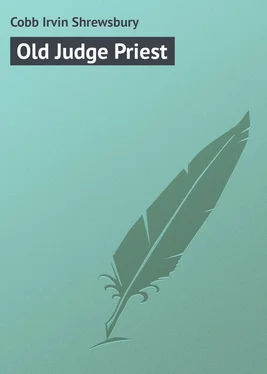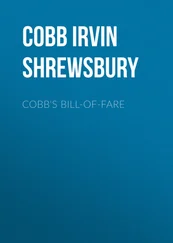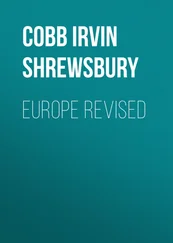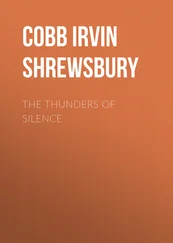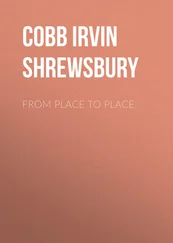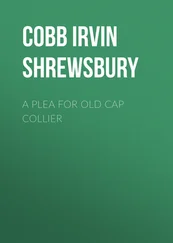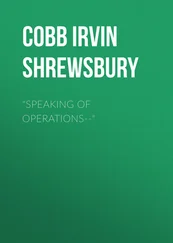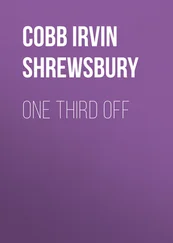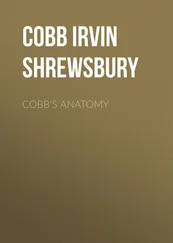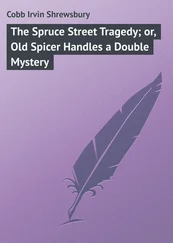Irvin Cobb - Old Judge Priest
Здесь есть возможность читать онлайн «Irvin Cobb - Old Judge Priest» — ознакомительный отрывок электронной книги совершенно бесплатно, а после прочтения отрывка купить полную версию. В некоторых случаях можно слушать аудио, скачать через торрент в формате fb2 и присутствует краткое содержание. Жанр: foreign_prose, на английском языке. Описание произведения, (предисловие) а так же отзывы посетителей доступны на портале библиотеки ЛибКат.
- Название:Old Judge Priest
- Автор:
- Жанр:
- Год:неизвестен
- ISBN:нет данных
- Рейтинг книги:5 / 5. Голосов: 1
-
Избранное:Добавить в избранное
- Отзывы:
-
Ваша оценка:
- 100
- 1
- 2
- 3
- 4
- 5
Old Judge Priest: краткое содержание, описание и аннотация
Предлагаем к чтению аннотацию, описание, краткое содержание или предисловие (зависит от того, что написал сам автор книги «Old Judge Priest»). Если вы не нашли необходимую информацию о книге — напишите в комментариях, мы постараемся отыскать её.
Old Judge Priest — читать онлайн ознакомительный отрывок
Ниже представлен текст книги, разбитый по страницам. Система сохранения места последней прочитанной страницы, позволяет с удобством читать онлайн бесплатно книгу «Old Judge Priest», без необходимости каждый раз заново искать на чём Вы остановились. Поставьте закладку, и сможете в любой момент перейти на страницу, на которой закончили чтение.
Интервал:
Закладка:
The coffin, showing through the glass sides, was of white cloth and it looked very small, almost like a coffin for a child. However, it may have looked so because there was little of its shape to be seen. It was covered and piled and banked up with flowers, and these flowers, strange to say, were not done into shapes of gates aswing; nor into shafts with their tops gone; nor into flat, stiff pillows of waxy-white tuberoses, pale and cold as the faces of the dead. These were such flowers as, in our kindly climate, grew out of doors until well on into November: late roses and early chrysanthemums, marigolds and gladioluses, and such. They lay there loosely, with their stems upon them, just as Mrs. Weeks had sheared them, denuding every plant and shrub and bush that grew in her garden, so a girl whom Mrs. Weeks had never seen might go to her grave with an abundance of the blossoms she had coveted about her.
Behind the hearse came a closed coach. We used to call them coaches when they figured in funerals, carriages when used for lodge turnouts, and plain hacks when they met the trains and boats. In the coach rode four women. The world at large had a way of calling them painted women; but this day their faces were not painted nor were they garishly clad. For the time they were merely women – neither painted women nor fallen women – but just women.
And that was nearly all, but not quite. At one side of the hearse, opposite the slowly turning front wheels, trudged Judge Priest, carrying in the crook of one bent arm a book. It wouldn’t be a law book, for they commonly are large books, bound in buff leather, and this book was small and flat and black in colour. On the other side of the hearse, with head very erect and eyes fixed straight ahead and Sunday’s best coat buttoned tightly about his sparse frame, walked another old man, Doctor Lake.
And that was all. At least that was all at first. But as the procession – if you could call it that – swung into Franklin Street it passed by The Blue Jug Saloon and Short Order Restaurant. In the doorway here lounged Perry Broadus, who drank. The night before had been a hard night upon Perry Broadus, whose nights always were hard, and it promised to be a hard day. He shivered at the touch of the clear, crisp air upon his flushed cheek and slanted for support against a handy doorpost of the Blue Jug. The hearse turned the corner, and he stared at it a moment and understood. He straightened his slouched shoulders, and the fog left his eyes and the fumes of staling alcohol quit his brain. He pulled off his hat, twisted his wreck of a necktie straight with a hand that shook and, cold sober, he ran out and caught step behind Judge Priest. Referring to pallbearers, Judge Priest had said the Lord would provide. But Perry Broadus provided himself.
I forget now who the next volunteer was, but I think possibly it was Sergeant Jimmy Bagby. Without waiting to analyse the emotions that possessed him in the first instant of realisation, the sergeant went hurrying into the road to fall in, and never thereafter had cause to rue his impulse, his one regret being that he had no warning, else he would have slipped on his old, grey uniform coat that he reserved for high occasions. I know that Mr. Napoleon B. Crump, who was active in church and charities, broke away from two ladies who were discussing parish affairs with him upon the sidewalk in front of his wholesale grocery, and with never a word of apology to them slipped into line, with Doctor Lake for his file leader. A moment later, hearing footfalls at his back, Mr. Crump looked over his shoulder. Beck Giltner, a man whom Mr. Crump had twice tried to have driven out of town and whom he yet hoped to see driven out of town, was following, two paces behind him.
I know that Mr. Joe Plumm came, shirtsleeved, out of his cooper shop and sought a place with the others. I know that Major Fair-leigh, who had been standing idly at the front window of his law office, emerged therefrom in such haste he forgot to bring his hat with him. Almost immediately the Major became aware that he was sandwiched in between the fat chief of the paid fire department and worthless Tip Murphy, who hadn’t been out of the penitentiary a month. I know that old Peter J. Galloway, the lame Irish blacksmith, wore his leather apron as he limped along, bobbing up on his good leg and down on his short bent one.
I know that Mr. Herman Felsburg brought with him four of the clerks of Felsburg Brothers’ Oak Hall Clothing Emporium. One of them left a customer behind, too, or possibly the customer also came. On second thought, I believe he did. I know that some men stood along the curbstones and stared and that other men, having first bared their heads, broke away to tail in at the end of the doubled lines of marching figures. And I know that of those who did this there were more than of those who merely stood and stared. The padding of shoe soles upon the gravel of the street became a steadily increasing, steadily rising thump-thump-thump; the rhythm of it rose above the creak and the clatter of the hearse wheels and the hoofs of the horses.
Lengthened and strengthened every few feet and every few yards by the addition of new recruits, the procession kept on. It trailed past shops and stores and jobbers’ houses. It travelled by the Y. M. C. A. and by Fraternity Hall. It threaded its way between rows of residences. It must have been two hundred strong when the hearse horses came abreast of that stately new edifice, with its fine memorial windows and its tall twin spires, which the darkies called the Big Rock Church. They didn’t stop here though. Neither did they stop at the old ivy-covered’ church farther along nor at the little red-brick church in the middle of the next block.
The procession kept on. Growing and still growing, it kept on. By now you might have counted in its ranks fit representatives of every grade and class, every cult and every creed to be found in the male population of our town. Old men and young men marched; bachelors and heads of families; rich men and poor; men who made public sentiment and men who defied it; strict churchgoers and avowed sceptics; men called good and men called bad. You might have ticked off almost any kind of man in that line. Possibly the Pharisees were missing and the Scribes were served only in the person of the editor of the Daily Evening News , who appeared well up toward the front of one of the files, with a forgotten cedar lead pencil riding in the crotch of his right ear. But assuredly the Publican was there and the Sinner.
Heralded by the sound of its own thumping tread and leaving in its wake a stupefaction of astonishment, the procession kept straight on down Franklin Street, through the clear October sunshine and under the sentinel maples, which sifted down gentle showers of red and yellow leaves upon it. It kept on until it reached the very foot of the street. There it swung off at right angles into a dingy, ill-kempt little street that coursed crookedly along the water front, with poor houses rising upon one side and the raw mud banks of the river falling steeply away upon the other.
It followed this street until the head of it came opposite a little squat box-and-barn of a structure, built out of up-and-down planking; unpainted, too, with a slatted belfry, like an overgrown chicken coop, perched midway of the peak of its steeply pitched tin roof. Now this structure, as all knew who remembered the history of contemporary litigation as recorded in the local prints, was the True Believers’ Afro-American Church of Zion, sometimes termed in derision Possum Trot, being until recently the place of worship of that newest and most turbulent of local negro sects, but now closed on an injunction secured by one of the warring factions within its membership and temporarily lodged in the custody of the circuit court and in the hands of that court’s servant, the high sheriff, pending ultimate determination of the issue by his honour, the circuit judge. Technically it was still closed; legally and officially still in the firm grasp of Sheriff Giles Birdsong. Actually and physically it was at this moment open – wide open. The double doors were drawn back, the windows shone clean, and at the threshold of the swept and garnished interior stood Judge Priest’s Jeff, with his broom in his hand and his mop and bucket at his side. Jeff had concluded his share of the labours barely in time.
Читать дальшеИнтервал:
Закладка:
Похожие книги на «Old Judge Priest»
Представляем Вашему вниманию похожие книги на «Old Judge Priest» списком для выбора. Мы отобрали схожую по названию и смыслу литературу в надежде предоставить читателям больше вариантов отыскать новые, интересные, ещё непрочитанные произведения.
Обсуждение, отзывы о книге «Old Judge Priest» и просто собственные мнения читателей. Оставьте ваши комментарии, напишите, что Вы думаете о произведении, его смысле или главных героях. Укажите что конкретно понравилось, а что нет, и почему Вы так считаете.
